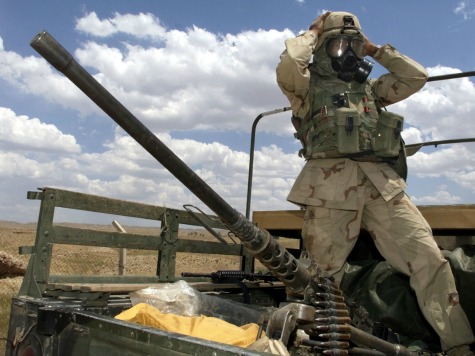The United States military secretly encountered thousands of chemical weapons during the Iraq war in Iraqi territory that is now controlled by the Islamic State, The New York Times reported.
Nevertheless, Rear Adm. John Kirby, the Pentagon press secretary, told reporters on October 15 that there is no evidence that Islamic State jihadists have obtained any of the chemical weapons that potentially remain in Iraq.
An extensive article by The Times published October 14 noted that the Islamic State (IS, also known as ISIS and ISIL) has been in control of the Al Muthanna State Establishment since June.
Al Muthanna is a compound that was notoriously known in the 1980s and 1990s as the hub of Saddam Hussein’s chemical weapons program.
According to the Iraqi government, Al Muthanna still contains chemical weapons.
“Since June, the [Al Muthanna] compound has been held by the Islamic State, the world’s most radical and violent jihadist group,” mentioned The Times article. “In a letter sent to the United Nations this summer, the Iraqi government said that about 2,500 corroded chemical rockets remained on the grounds, and that Iraqi officials had witnessed intruders looting equipment before militants shut down the surveillance cameras.”
“The knowledge that mustard shells remained on Al Muthanna remained out of the public view, long after two wars and an international effort to remove them,” added the article.
The compound is described by The Times as “a principal source” of the nearly 5,000 chemical weapons that the U.S. military discovered in Iraq after the American invasion in 2003. The U.S. government refused to publicly disclose those discoveries.
“Since the outset of the [Iraq] war, the scale of the United States’ encounters with chemical weapons in Iraq was neither publicly shared nor widely circulated within the military,” reported the paper. “These encounters carry worrisome implications now that the Islamic State, al Qaeda splinter group, controls much of the territory where the weapons were found.”
“In all, American troops secretly reported finding roughly 5,000 chemical warheads, shells or aviation bombs, according to interviews with dozens of participants, Iraqi and American officials, and heavily redacted intelligence documents obtained under the Freedom of Information Act,” added the article.
Many of the chemical weapons discoveries were concentrated near Al Muthanna.
“By mid-2008, as incidents with mustard shells accumulated, ordnance disposal techs suspected one area had become a principal source of the weapons: Al Muthanna State Establishment, the former nexus of Iraq’s chemical warfare program,” mentioned The Times. “Although incidents with chemical arms were scattered across Iraq, many were clustered near the ruined complex, which this June was overrun by the Islamic State.”
The Obama administration played down the significance of Islamic State militants taking over Al Muthanna in June.
“We remain concerned about the seizure of any military site by the ISIL,” said Jen Psaki, the State Department spokeswoman, in a written statement in June. “We do not believe that the complex contains CW [chemical weapon] materials of military value and it would be very difficult, if not impossible, to safely move the materials.”
Breitbart News reported that disturbing pictures recently made public by a Middle East watchdog organization suggest that IS used chemical weapons that it possibly obtained from Al Muthanna against Kurdish fighters in July.
Between 2004 and 2011, U.S. and U.S.-trained Iraqi troops repeatedly came across chemical weapons in Iraq “and on at least six occasions were wounded” as a result, The Times found.
At least 17 American soldiers and seven Iraqi police officers “were exposed to nerve or mustard agents after 2003,” according to the article, a count that U.S. officials told The Times could be higher.
After the U.S. withdrew its military force at the end of 2011, Iraq drafted a plan to entomb the Al Muthanna compound, which at the time still contained “remnant chemical stocks, in concrete,” the article noted.
However, that never came to pass.
Members of the public, troops involved, military doctors, and to some extent Congress were all kept in the dark about the chemical weapon discoveries in Iraq, The Times noted.
Ultimately, the military services will have to investigate the allegations that soldiers did not receive adequate treatment after being exposed, Kirby told reporters on October 15.
“I don’t expect that there’s going to be … a Pentagon-level review of these particular cases,” he said. “We take any indication, any indication that a member of the armed services did not get the medical care that they deserve seriously, just like we take any indication that they didn’t get any other kinds of support that they deserved seriously.”

COMMENTS
Please let us know if you're having issues with commenting.